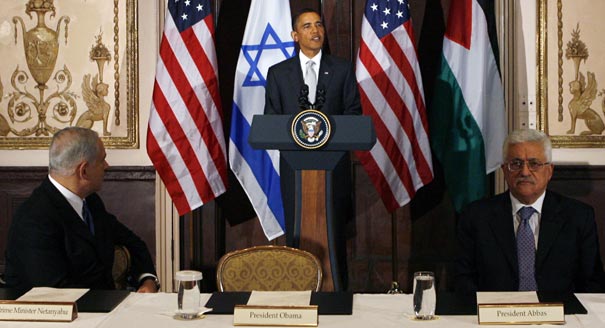From Sudan to Ukraine, UAVs have upended warfighting tactics and become one of the most destructive weapons of conflict.
Jon Bateman, Steve Feldstein
{
"authors": [
"Marwan Muasher"
],
"type": "questionAnswer",
"centerAffiliationAll": "",
"centers": [
"Carnegie Endowment for International Peace",
"Malcolm H. Kerr Carnegie Middle East Center"
],
"collections": [
"Arab Awakening"
],
"englishNewsletterAll": "",
"nonEnglishNewsletterAll": "",
"primaryCenter": "Malcolm H. Kerr Carnegie Middle East Center",
"programAffiliation": "",
"programs": [
"Middle East"
],
"projects": [],
"regions": [
"Middle East",
"Israel",
"Palestine",
"Levant"
],
"topics": [
"Political Reform",
"Security"
]
}
A two-state solution will soon be impossible. Despite the difficulties, the United States needs to make a major effort to find a solution—the costs of waiting are much too great.
With the recent outbreak of violence in Gaza, the Palestinians’ push for observer status at the United Nations General Assembly, and more Israeli settlements in the West Bank that could divide a future Palestinian state, hope for the peace process seems all but lost.
In a Q&A, Marwan Muasher says a two-state solution will soon be impossible. Yet, despite the difficulties that lie ahead, the United States needs to make a major effort to find a solution before time runs out—the costs of waiting are much too great.
The United States faces a number of domestic and foreign challenges that will unfortunately push the peace process down the agenda. The fiscal cliff is just one example of a domestic concern that will take up time that could be devoted to foreign affairs.
And in the Middle East alone, Obama needs to determine what to do with Iran, Syria, and the transformations taking place in the region as a result of the Arab Awakening. This means that the Arab-Israeli conflict will even be a relatively low priority in terms of regional issues. The administration simply feels like the two sides are not ready to make a deal.
But this is a mistake. Time is not infinite and there is a very small, and closing, window for a two-state solution. If the United States wants to avoid the mess that a lack of a solution will create, it must act now.
The reason a chance for a two-state solution is slipping away is Israeli settlement activity. There are over 500,000 settlers in the West Bank and East Jerusalem and this is destroying the prospects for peace. It’s unclear how the two communities are ever going to be separated even if a breakthrough is found today.
If the world keeps waiting for a better time, more Israeli settlements will be built, particularly in East Jerusalem, making a two-state solution impossible to implement. It’s important to understand that for Arabs and Palestinians, any solution that does not give them East Jerusalem is no solution at all. Jerusalem must be part of the equation.
And demographic trends within Israel make any other possible deal, particularly a one-state solution, incredibly problematic. There are an equal number of Arabs and Jews—6 million—in areas under Israeli control, and the Arab population is growing at a faster rate.
If there is no two-state solution, the demographics will take center stage and Israel will no longer be able to ignore reality. The Jewish population could become a minority in a one-state solution and it’s safe to assume that Palestinians will demand equal rights and that their voices are heard.
The United States needs to undertake a huge effort to bring about a resolution. But even though the basic framework for a two-state solution is already known, based on the parameters Bill Clinton outlined in 2000 and the 2002 Arab Peace Initiative, work needs to be done before something new is put on the table.
The administration must begin by engaging in private discussions with all of the major players. This includes conversations with Arab states, principally the Saudis, to make sure the elements of a package satisfy their needs, particularly on East Jerusalem.
It also needs to determine the redlines for both the Palestinians and Israelis on issues like refugees, disarming Hamas and Hezbollah, and borders. Understanding the redlines offers greater clarity on what each side can give if their own needs are met.
And finally, Obama will need to deal with the American public, especially the Jewish community. In order for any agreement to be sellable at home, Americans need to face the fact that failure to secure an agreement on a two-state solution has grave implications for the future survival of the state of Israel.
Once this is done, the United States along with other members of the so-called Quartet, which also includes the United Nations, the European Union, and Russia, can put together a comprehensive package and invite all parties to an international conference. The timeframe for all of this should be months, not years.
If the president is not personally ready to completely commit to this plan, one idea floating around is to appoint a high-level envoy with full authority to drive the peace process forward. Some are suggesting that someone with enough stature to make history, like former president Bill Clinton, might be needed, or that the president should truly empower his next secretary of state to do the job.
While this sounds idealistic and too far-fetched to many people, Obama should consider the alternative: not securing a solution could lead to bloodshed and turmoil in the Middle East and the continued deterioration of U.S. credibility in the region.
Some within the administration have mentioned that the United States should offer a quid pro quo to compel Israel in particular to act: a strike on Iran for movement on the peace process. This would be similar in some ways to the first Gulf War when then president George H. W. Bush launched the Madrid peace process.
But there are legitimate doubts as to whether this is really an option. First, the Arab world would only move forward on talks if leaders were convinced that it was not just another time to talk while settlement activity continued.
Second, it is doubtful that the Israeli government under the current coalition will acquiesce to such a scenario. And third, the wide belief is that Washington is not going to bomb Iran until diplomacy and all other options are exhausted—this is at least two years away and the peace process can’t wait that long.
A renewed diplomatic effort is extremely difficult, but the costs of waiting are much higher. The status quo cannot be frozen as the facts are changing on the ground. There won’t be a better time. Obama must start now—waiting for the next president is not a luxury that exists.
Hypothetically, if the elections result in a victory by someone more centrist, then the outlook for peace could change. But that is unlikely at this stage. Prime Minister Benjamin Netanyahu and the Likud party look headed for reelection and will partner with the hardliner Avigdor Lieberman and his Yisrael Beiteinu party.
With that said, the majority in Israel still wants to see a two-state solution. The problem is that they don’t think it is possible because no one has shown them it is and there isn’t a sense of urgency. Right now, Israel largely doesn’t think it needs to deal with the Palestinian question as it feels relatively secure behind the wall it constructed and its economy is doing well.
Netanyahu’s strategy is to keep changing the facts on the ground until a two-state solution is inconceivable. Then he will contemplate other solutions. He may consider a unilateral withdrawal behind a wall in a way that would keep East Jerusalem and part of the West Bank in Israel’s hands. The problem is that this would not solve anything as Arabs and the Palestinians would not accept it. He could also try to make life very difficult for the Palestinians and hope that they ultimately leave.
While no one in Israel has articulated a public strategy if a two-state solution becomes impossible, these are the options that people are talking about. But a two-state solution is no longer just in the interests of the Arabs and Palestinians; it’s in Israel’s interest as well.
The Palestinians are weak and divided between Hamas and Fatah. There are essentially two different entities: one in the West Bank and one in Gaza. But both remain unconvinced that Israel is ready and willing to give them the minimum they need to create a viable state.
And the Palestinians have basically run out of options, which is why Palestinian Authority President Mahmoud Abbas made the request for nonmember observer status at the United Nations. This is an effort to establish in legal terms what can’t be established on the ground at this point. But he knows that this doesn’t solve the problem.
Presidential and parliamentary elections also continue to be pushed back. Without a new vote that is seen as credible, there are questions about the legitimacy of the present structure.
The thing that could change the game is a Palestinian uprising. It’s unclear if there will be one at this stage, but this could force the international community and Israel to deal with these issues differently.
The solution to the conflict cannot be a deal between Israelis and Palestinians—it needs to be a regional deal to work. Israel needs to reach an agreement with all Arab countries and Arab countries need to back the painful compromises that the Palestinians will need to make.
With the Arab Awakening, the region is undergoing massive change. Israel now faces a situation where bilateral peace treaties will not be abrogated, but new governments won’t lift a finger to help without a solution to the Israeli-Palestinian conflict.
Syria, of course, is in no position to engage today, but any new regime will accept a deal that gives it back the Golan Heights along the June 4, 1967, border. It has come to be known that President Bashar al-Assad and Netanyahu were close to a deal until the Syrian uprising erupted—and this means that Israel has already agreed in principle to withdraw.
The Arab powers cannot be ignored and must be a part of the process. But it’s important to remember that while any solution relies on Arab support, effective U.S. engagement is still critical.
Carnegie does not take institutional positions on public policy issues; the views represented herein are those of the author(s) and do not necessarily reflect the views of Carnegie, its staff, or its trustees.
From Sudan to Ukraine, UAVs have upended warfighting tactics and become one of the most destructive weapons of conflict.


Jon Bateman, Steve Feldstein
And how they can respond.



Sophia Besch, Steve Feldstein, Stewart Patrick, …
They cannot return to the comforts of asymmetric reliance, dressed up as partnership.

Sophia Besch
Baku may allow radical nationalists to publicly discuss “reunification” with Azeri Iranians, but the president and key officials prefer not to comment publicly on the protests in Iran.

Bashir Kitachaev
Carnegie scholars examine the crucial elements of a document that’s radically different than its predecessors.



James M. Acton, Saskia Brechenmacher, Cecily Brewer, …